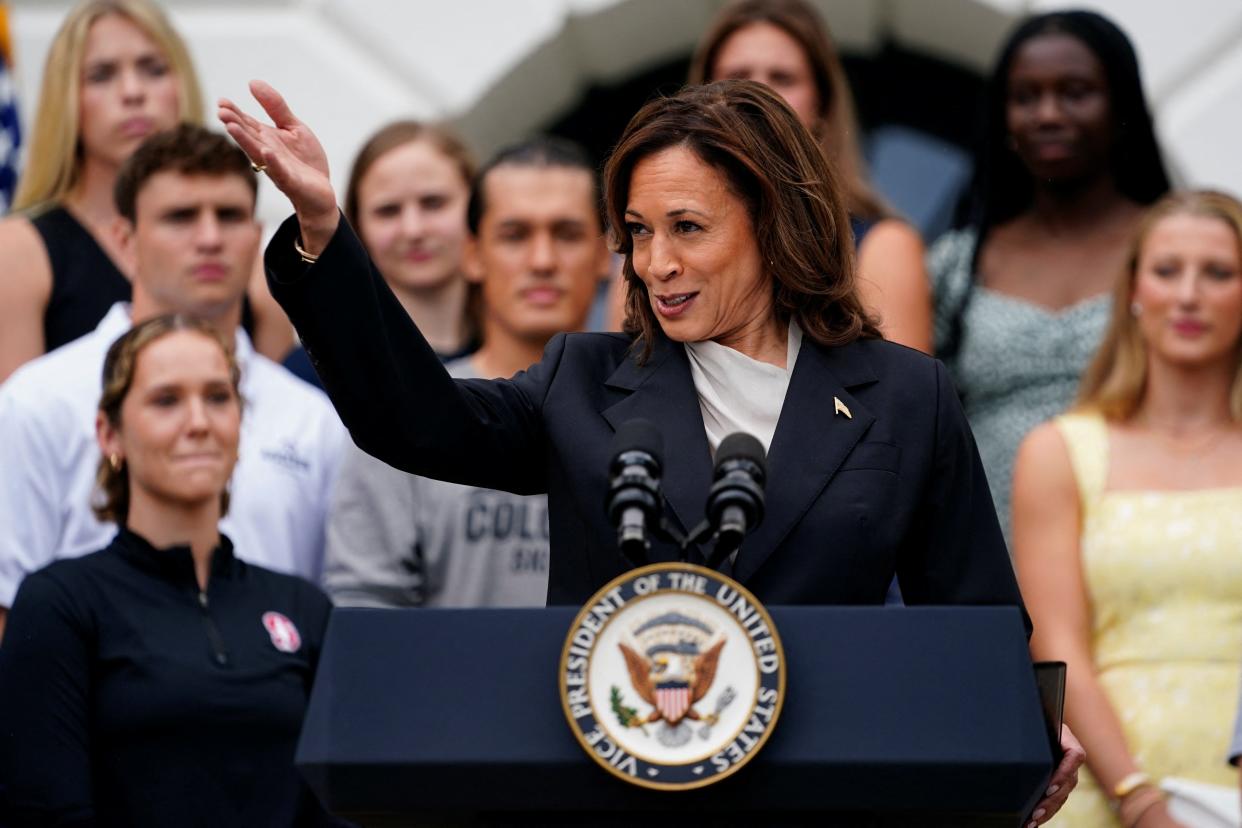What is the 25th Amendment? Why Kamala Harris isn’t president

- Oops!Something went wrong.Please try again later.
Vice President Kamala Harris now has enough promised delegates to be the Democratic Party’s candidate in the November election.
Her quick rise to the top comes after President Joe Biden backed out of the race this weekend and put his endorsement on his running mate instead.
The rapid response by party officials across the country should help avoid a messy Democratic National Convention next month, but it also has voters wondering about the rules involving presidential succession.
Who is president?
No, Harris doesn’t automatically become President Kamala Harris now that Joe Biden has dropped his campaign for a second term.
Biden is staying in office until his term is up on Jan. 20, 2025.
But, yes, Harris would become president if Biden also abandoned the White House before the inauguration of the next president. That’s what the 25th Amendment covers.
What is the 25th Amendment?
The 25th Amendment spells out the process, but it — and all of the Amendments to the Constitution can be a little rough to read.
Here’s a quick summary of each, minus the scholarly debates and political interpretations:
First Amendment (1791): You have the freedom to speak, practice any religion, write what you want, gather peacefully, and complain to the government because the Founders wanted to protect individual freedoms.
Second Amendment (1791): You can own guns because the Founders believed in the need for a well-regulated militia for security.
Third Amendment (1791): Soldiers can’t stay in your house without your permission because people hated it when British troops did this before the Revolution.
Fourth Amendment (1791): No one can search your stuff without a good reason or a warrant because people wanted to protect their privacy from government intrusion.
Fifth Amendment (1791): You can’t be forced to testify against yourself, be tried twice for the same crime, or lose your rights without fair legal procedures because fairness in legal processes is crucial.
Sixth Amendment (1791): You get a quick, public trial with a jury, and a lawyer if you’re accused of a crime because everyone deserves a fair defense.
Seventh Amendment (1791): You can have a jury trial in civil cases involving a lot of money because it ensures fairness in significant disputes.
Eighth Amendment (1791): No cruel or unusual punishments, and no super high bail or fines because punishments should be fair and not excessive.
Ninth Amendment (1791): You have other rights that aren’t listed in the Constitution because the Founders knew they couldn’t list every right.
Tenth Amendment (1791): Anything not covered by the federal government is up to the states or the people because the Founders wanted to limit federal power.
Eleventh Amendment (1795): You can’t sue a state in federal court if you don’t live there because states wanted to protect themselves from certain lawsuits.
Twelfth Amendment (1804): The President and Vice President are elected together on the same ticket because of problems with the original election process.
Thirteenth Amendment (1865): Slavery is illegal because the Civil War showed the need to end this practice.
Fourteenth Amendment (1868): If you’re born in the U.S., you’re a citizen, and everyone gets equal protection under the law because it clarified citizenship and equal rights after the Civil War.
Fifteenth Amendment (1870): You can’t be stopped from voting because of your race because it aimed to ensure voting rights for African Americans after the Civil War.
Sixteenth Amendment (1913): The government can collect income taxes because it provided a way to fund federal programs.
Seventeenth Amendment (1913): Senators are elected by the people, not state legislatures because it made the election process more democratic.
Eighteenth Amendment (1919): Alcohol is illegal (but this was later changed by the 21st Amendment) because of the temperance movement’s influence.
Nineteenth Amendment (1920): Women can vote because it was a major step toward gender equality.
Twentieth Amendment (1933): Presidential and Congressional terms start in January because it shortened the “lame duck” period.
Twenty-First Amendment (1933): Alcohol is legal again (overturns the 18th Amendment) because Prohibition was widely unpopular and led to other problems.
Twenty-Second Amendment (1951): Presidents can only serve two terms because they wanted to prevent any one person from holding too much power for too long.
Twenty-Third Amendment (1961): Washington D.C. residents can vote for President because D.C. residents wanted representation in presidential elections.
Twenty-Fourth Amendment (1964): No poll taxes for voting because these taxes were used to prevent poor people, especially Blacks, from voting.
Twenty-Fifth Amendment (1967): The Vice President takes over if the President can’t do the job because it clarified the line of succession.
Twenty-Sixth Amendment (1971): You can vote at 18 because 18-year-olds were being drafted for war and deserved the right to vote.
Twenty-Seventh Amendment (1992): Congress can’t give itself a pay raise that starts before the next election because it ensures accountability for pay raises.
This article originally appeared on Cherry Hill Courier-Post: What is the 25th Amendment? Why Kamala Harris isn’t president

